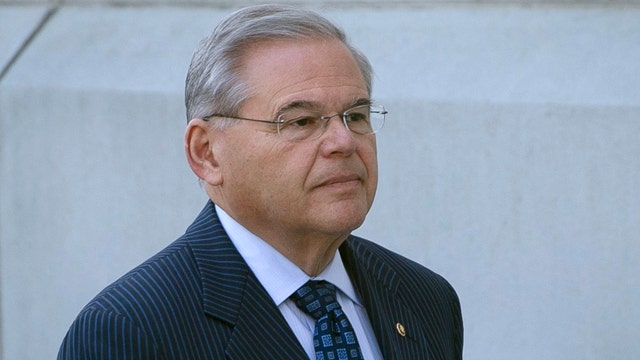Menendez remains defiant amid federal corruption charges
Senate Democrat accused of using office to help donor
The federal indictment against Sen. Bob Menendez, D-N.J., which led him to relinquish his post as top Democrat on the Senate Foreign Relations Committee, could complicate efforts on Capitol Hill to have a say on the nuclear deal being sought with Iran.
Menendez is sticking around, while vowing to fight the corruption charges -- but he's being replaced, for now, in his post on the committee by Sen. Ben Cardin, D-Md., who's not known for taking a hard line on Iran the way Menendez is.
With the framework for a nuclear deal being announced by international negotiators on Thursday, two major bills are on the table in Congress that negotiators say could complicate talks. One would trigger additional sanctions if Iran balks; the other would demand Congress have a say in any agreement.
Cardin has spoken broadly about the need for Congress to act on Iran but has not been a forceful advocate for additional sanctions if the rogue nation fails to live up to an international agreement limiting its nuclear program.
Cardin has backed sanctions legislation in the past but is not a cosponsor of either of the Senate's two Iran bills -- both of which were authored in part by Menendez, an outspoken critic of the Iranian regime.
In a written statement, Cardin said the framework and any final agreement "cannot be based on trust," when it comes to Iran. He called for congressional involvement, without speaking directly to the bills on the table. "The final agreement must be verifiable and transparent, making it clear that any violations would result in an immediate restoration of the strongest possible sanctions. Congress has a role to play in this process and I look forward to reviewing all the details of this long-sought agreement that Secretary of State John Kerry and our allies have negotiated," he said.
While Menendez wants to reclaim his status as ranking member once his case is resolved, the shakeup comes at an especially sensitive time for the Foreign Relations Committee as it prepares to mark up the legislation that would allow Congress to sign off on the Iran deal.
In a one-sentence statement, Chairman Bob Corker said he appreciates Menendez's bipartisan efforts and expects "he will continue to play a constructive role," even as a rank-and-file member of the panel.
Corker, Menendez and other cosponsors of the Iran Nuclear Agreement Review Act will need all the help they can get in rounding up 67 votes to override a veto. The 54-member Senate GOP caucus backs the effort but Democratic backers have been harder to come by as the White House has leaned on its congressional allies -- even those skeptical of talks with Iran -- to give international negotiators more time.
Corker said Thursday's announcement of a tentative framework between the so-called P5+1 and Iran only underscores the need for Congress to review the fine print.
"If a final agreement is reached, the American people, through their elected representatives, must have the opportunity to weigh in to ensure the deal truly can eliminate the threat of Iran's nuclear program and hold the regime accountable," said the Tennessee Republican, who has scheduled an April 14 markup of the review bill.
Senate Majority Leader Mitch McConnell has vowed to bring Iran legislation to the floor one way or another, although it's not clear whether it would be the sanctions bill co-sponsored by Menendez and Republican Sen. Mark Kirk or the Corker-Menendez measure. Democrats, with the help of Menendez, killed a previous push by McConnell to fast-track Iran legislation ahead of the negotiations deadline.
Cardin was a signatory on a letter last month from 10 Democrats telling McConnell they would support Corker-Menendez after the deadline. While that gives supporters the votes to break a Senate filibuster, they still need backing from three more Democrats for a veto-proof majority -- assuming the others are still on board.
Senate Democratic aides rejected the idea that the Menendez indictment and his decision to step aside would have any impact on how Democrats will vote on Iran legislation.
"I think the details of the deal itself will far outweigh the significance of Senator Menendez stepping down temporarily as ranking member, particularly since he will continue to be active in this debate, in terms of future legislative action," one aide said.
A separate aide added: "His situation [is] wholly unrelated to the issue. The issue and the contents of the bill are very well known."
In an appearance on "Fox News Sunday" last month, Cardin wouldn't take a position on what Congress should do, saying only that lawmakers would need to be involved in some capacity.
"The Congress is going to have to be engaged here. We imposed the sanctions," Cardin said, later adding: "We have the right to pass legislation. We can counter what the president has done; we can support what the president has done."
Obama allies on Thursday suggested Congress should take a "wait-and-see approach."
"Now is the time for thoughtful consideration, not rash action that could undermine the prospects for success. We have much to learn about what was negotiated and what will take place between now and the end of June," Senate Democratic Leader Harry Reid said.





